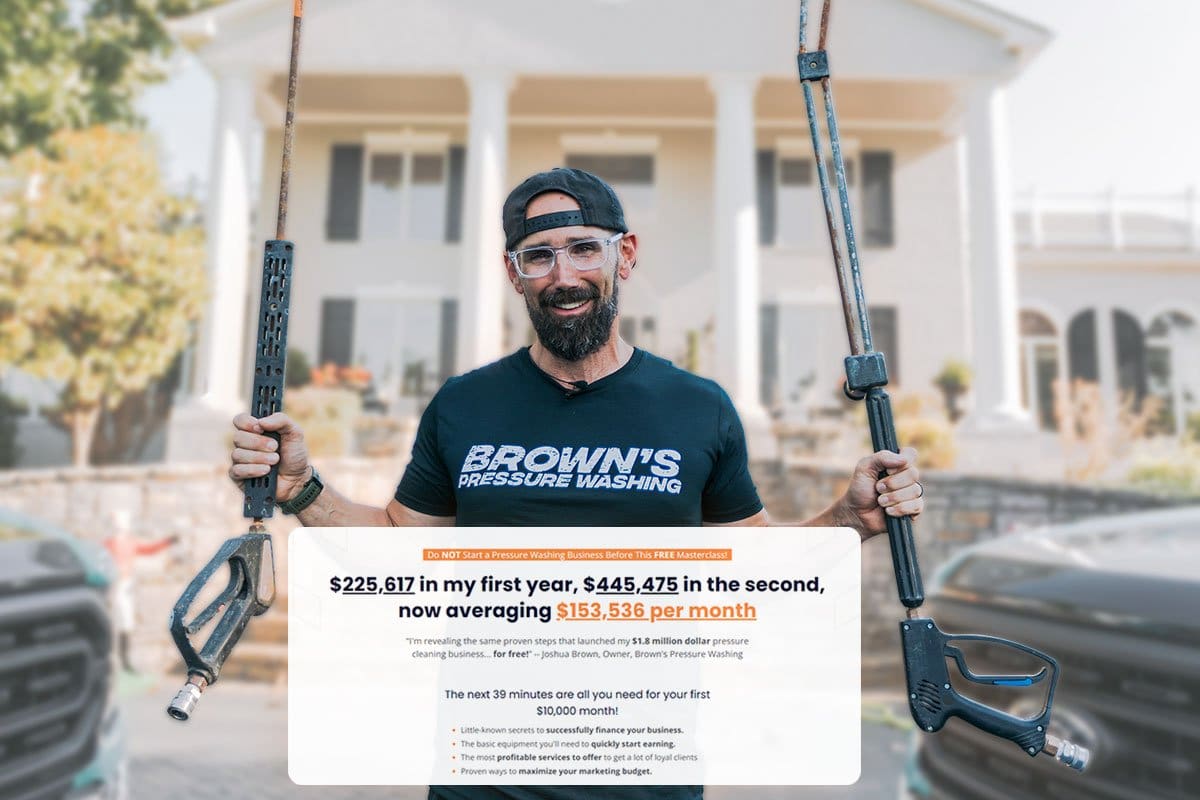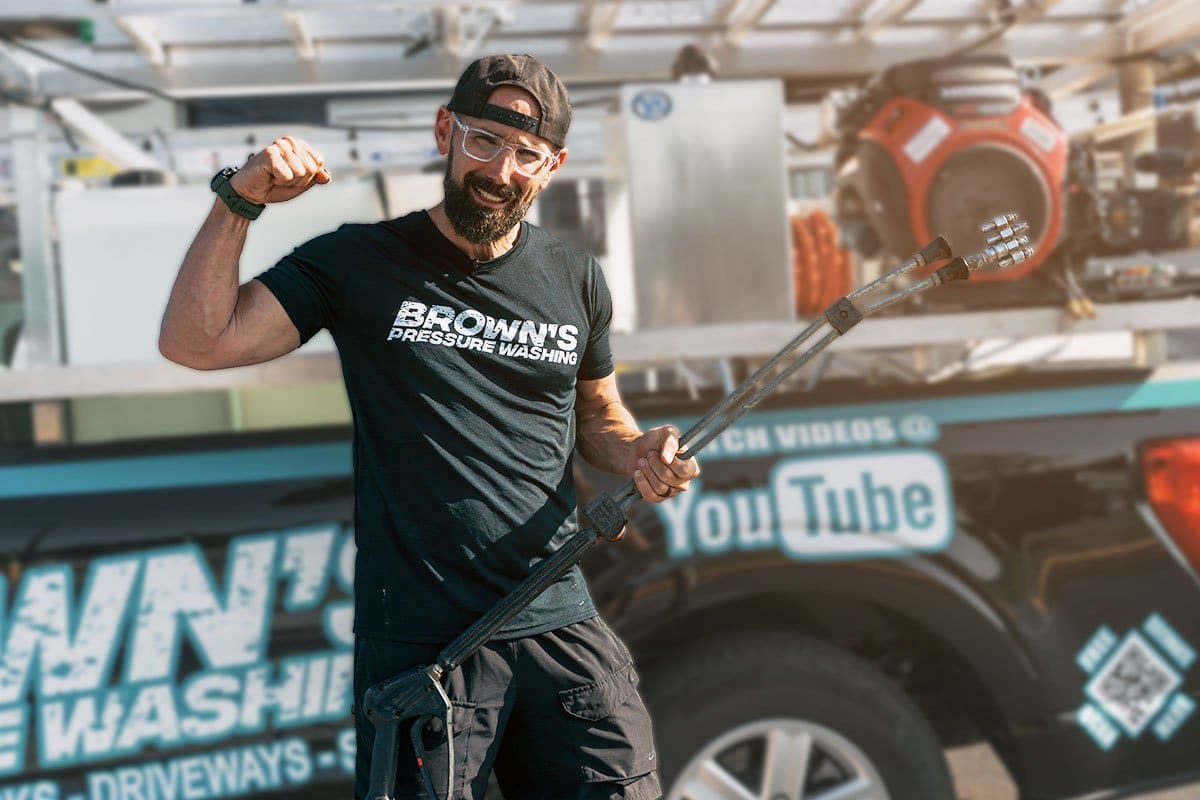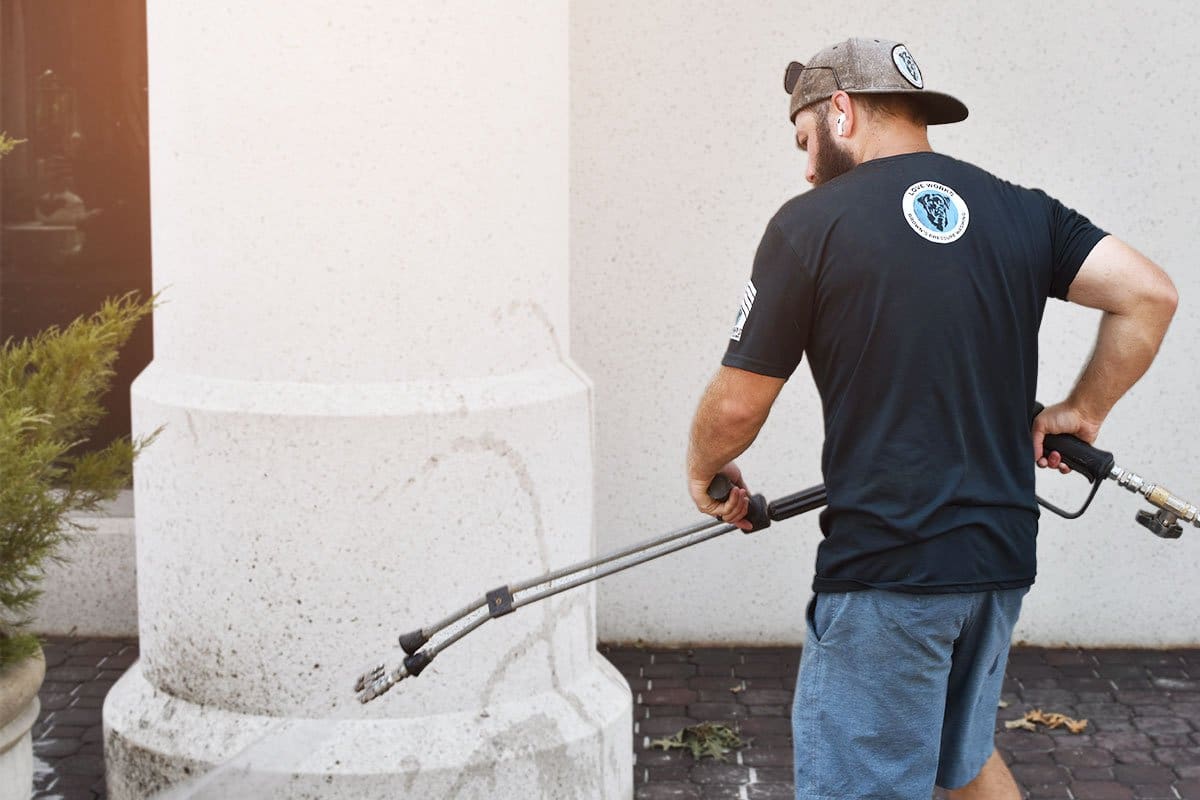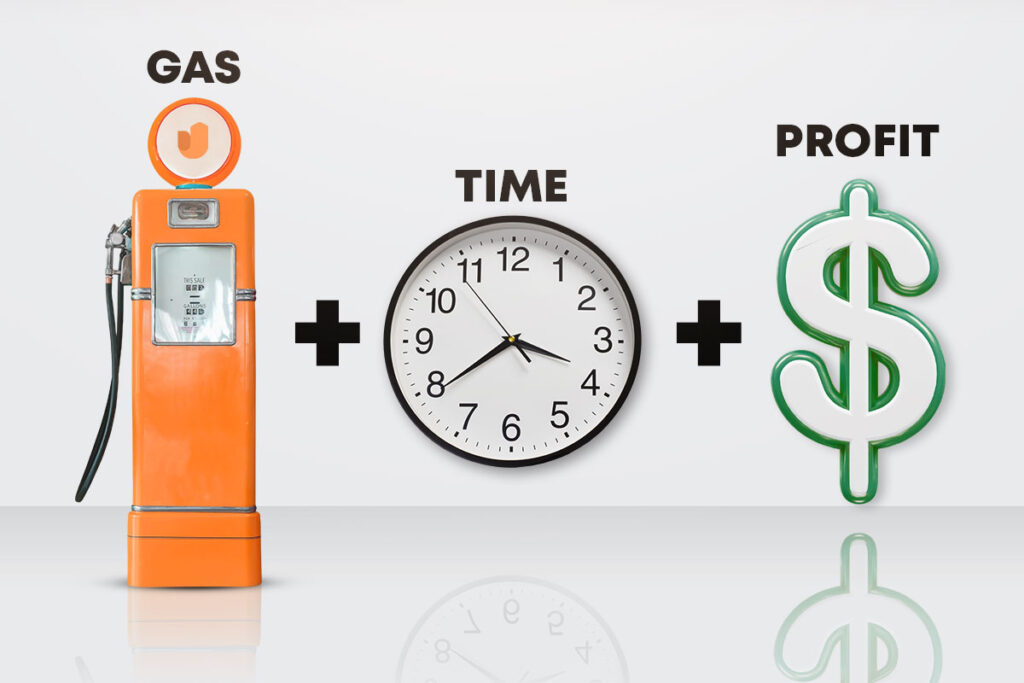If you want to go where you’ve never gone, you’ll have to change what you’ve always done.
We’ll show you how to start a pressure washing business. Owning a pressure washing business has changed Joshua Brown’s life, and it can do the same for you.
Josh started Brown’s Pressure Washing with just $5K and grew it to $1M in annual revenue in just four years. You’ll be amazed at how he went from a life of poverty to telling himself, “I’m tired of creating someone else’s kingdom.”
We’ll share his pressure washing mistakes and lessons learned. You can benefit from his experiences to start a pressure washing business that helps you thrive financially. We’ll also share an industry breakdown and tips on equipment, marketing, and more.
You can either keep reading or click on any of the links below to jump to the section that interests you:
What is pressure washing?
Pressure washing uses high-pressure water to remove grease, dirt, and other grime from surfaces. Customers may want you to clean roofs, walls, patios, and driveways to help make their properties look pristine.
Case Study: Brown’s Pressure Washing

Joshua Googled “top 5 businesses to start with $5,000,” and that’s how he started Brown’s Pressure Washing. We’ll show you how to start a pressure washing business that grows from $5K invested to $225K, $445K, $780K, and then nearly $1M in revenue in its first four years.
Today, Brown’s Pressure Washing makes $2M in annual revenue.
It wasn’t without struggle. Josh made a ton of mistakes. He ran out of gas and chemicals and didn’t know what an O-ring was, but he learned along the way.
Find out how Josh grew Brown’s Pressure Washing in our interview below:
Learn About the Pressure Washing Industry
If you want to know how to start a pressure washing business, you have to understand the industry. We’ll answer some common questions about pressure washing businesses that people commonly ask.
How much does it cost to start a pressure washing business?
You can start a successful pressure washing business for between $220 and $48K depending on whether you have a vehicle and pressure washing equipment. Joshua explained:
Before starting your own pressure washing business, you’ll need to cover the following costs:
• Limited liability company formation: $50 to $900
• Pressure washing business license: $0 to $1K
• Pressure washer: $100 to $3K
• Nozzles and hoses: $20 to $100
• Water tank: $100 to $900
• Vehicle: $0 to $35K
• Auto insurance: $1.8K annually (according to Insureon)
• Smartphone and plan: $0 to $1.8K
• Business software: $0 to $500
• Marketing: $0 to $5K
Joshua invested $5K to start his business. He bought a boat trailer for $300 and a pressure washer for $3,500. Equipment and other expenses accounted for the remainder of his relatively low startup costs.
Need help getting funding for your pressure washing business? Apply for up to a $50,000 loan on Borrow Nation.
How much does a pressure washer business make?
Pressure washing businesses have an average annual revenue of $45,073 with an average profit margin of 8.44%. Some of the most successful pressure washing businesses make substantially more.
Brown’s Pressure Washing makes $150K per month.
Is a pressure washing business profitable?
Yes. A pressure washing business will normally have a net income ratio of between 5.6% and 8.4% of revenue, but Joshua told us his profit margins are typically between 20% and 30%.
A pressure washing business owner should anticipate the following expenses:
• Wages: 21% to 31% of revenue
• Purchases: 31% to 50% on equipment, vehicles, and other purchases
• Marketing: At least 1.5% to 3% but as high as 8% to 12%
• Rent: 1% to 2% of revenue if not using a home office
• Utilities: 0.3% to 2.1% of revenue
• Depreciation: 1% and 2% of revenue
• Other costs: 17.8% to 22.8% of revenue
• Profit: 5.6% and 8.4% with the potential to increase by automating services
What equipment do I need to start a pressure washing business?

At a minimum, you need the following pressure washer equipment:
- Pressure washer
- Pump
- Water hoses
- Nozzles
- Surface cleaner
- Ladder
- Telescoping wand
- Downstream injector
- Chemicals
- Detergent tank
Additional equipment needed for pressure washing business operations may include:
- Water source (a water tank is best, but you can use a garden hose)
- Trailer
- Angled tips
- Generator
- Hydrostatic line testers
- Dual lance
Nozzles impact how a pressure washer operates. They are calibrated in degrees, and lower numbers create more powerful streams.
For example, a 65-degree nozzle works well for dousing concrete with detergent. Meanwhile, a lower angle might be better for commercial pressure washing services that need to get gum off the sidewalk in front of local businesses.
A surface cleaner is a tool that attaches to your pressure washer to clean large, flat surfaces like patios, driveways, and sidewalks.
Do I need a license to start a pressure washing business?

You may need a license when starting a pressure washing business depending on your location. Some states require a license, while others do not.
License requirements for pressure washing businesses include:
- Business license: You might need a state small business license and a sales tax license if you sell taxable services and products.
- Occupational license: Some states and local governments require a pressure washer license.
- Handyman’s license: You may need a handyman license to offer pressure washer and roof cleaning services.
Check with your local municipality to find out what bonds, contractor licenses, insurance, permits, and registrations are needed in your location.
Pro Tip: Be aware that opening an unlicensed company of any kind can result in fines or even criminal charges.
Learn How to Use a Pressure Washer
Before you start a pressure washing business, you should learn how to use all the necessary equipment. Home and business owners expect quality results.
If you know how to efficiently and effectively pressure wash several surface types, including stone, cement, wood, and shingles, you’ll make your pressure washing company stand out.
Here are some of the best pressure washing business resources and learning opportunities:
- Hands-on practice: Learn and get paid by another pressure washing business while you develop your skills.
- The Environmental Protection Agency: Contact the EPA to learn about pressure washing regulations.
- United Association of Mobile Contract Cleaners: The UAMCC provides certifications, publications, online learning, and hands-on learning.
- YouTube Videos: YouTube offers numerous pressure washing tutorials.
Start a $150K/Month Pressure Washing Business From Scratch! |
|
| Get a step-by-step blueprint on how to start a successful pressure washing business. Learn directly from Joshua, whose pressure washing business now makes $150K a month. He dives into the winning mindset you need to thrive in this industry and reveals the secrets to booking big jobs. With his proven methods, you’ll have everything you need to launch your business and hit the ground running. | |
| Join the UpFlip Academy! | |
How to Start a Pressure Washing Business
Starting your own pressure washing business follows this general process:
- Establish a business structure.
- Buy your pressure washing setup.
- Set your rates.
- Set up your banking.
- Establish marketing channels.
Step #1. Establish a Business Structure
Starting a business requires forming a business structure for your pressure washing company. You’ll want to choose a business structure like a limited liability company (LLC), corporation, or sole proprietorship.
A sole proprietorship uses a “doing business as” (DBA) name and your social security number to operate under a different business name. This low-cost business structure leaves you personally liable for everything that occurs in your business, so legal experts don’t recommend it.
Meanwhile, an LLC or corporation will protect from personal liability.

To register your business, perform a name search on the secretary of state’s website for the business name you want to use to make sure it’s available. Next, file the appropriate paperwork and pay the registration fee, which may be $200 to $700, to create the business entity.
Step #2. Buy Your Pressure Washing Setup
You’ll need the right equipment to start a successful pressure washing business. Josh says that when you’re just starting, you’ll need at least the following:
- Pressure washing trailer
- Pressure washer
- Bumper tank
- Chemical tank
- Water tank
- Wand
Even though the equipment can cost around $15K, it can earn you $200K per year. You could spend less on pressure washing equipment, but the money you save might slow your business growth.
Washing with lower pressure means you can’t take as many customers. A lower-quality pressure washer might also break down more frequently.
You should also consider an equipment rig that can go in the back of a truck. Josh told us:
You’ll probably want equipment insurance to protect against loss due to theft, damage, or malfunctions.
Pro Tip: Read our trailer setup guide to learn more about Brown’s Pressure Washing trailers.
Step #3. Set Prices for Pressure Washing Services

Now that we’ve covered your initial startup costs, it’s time to move on to pricing. Brown’s focus is on pressure washing homes and businesses. His best pressure washing contract is with Top Golf at $60K annually.
Josh explained that his crew can clean four homes daily with a pressure washing trailer or skid. He charges $300 for each job. His primary pressure washing services are:
- House wash
- Roof wash
- Concrete cleaning and sealing
- Gutter cleaning
- Window cleaning
- Commercial building cleaning
They use a unique technique called a softwash. Softwash systems differ from regular pressure washing services because they use less pressure, which makes them less likely to damage a customer’s property.
How to Charge for Pressure Washing
All price data in this section comes from HomeGuide. There are essentially three ways to determine the price of a pressure washing job:
• Space: $0.35 to $0.77 per square foot
• Time: $50 to $160 per hour
• Service: $100 to $500 flat rate
Charging by Space
Charging by square footage is transparent for your potential customers. Here’s a breakdown of average prices for different pressure washing services:
• Driveway: $0.50 per square foot
• Patio or Deck: $0.55 per square foot
• Fencing: $0.45 per square foot
• Roofing: $0.70 per square foot
• Siding: $0.50 per square foot
Charging by Time
To charge by time, multiply the time you think a job will take by your hourly rate. Don’t forget to include the time to estimate, book, and travel to the job in your calculation.
Charging by Service
Many businesses offer set prices for certain kinds of services. This can make budgeting easier for both the business and the client.
For example, your business could charge a set fee of $100 to pressure wash a deck, $150 to pressure wash a driveway, and $250 to pressure wash the exterior of a house. You’ll need to decide which services to provide and how much to charge for each.
To decide on a final price, you’ll also need to consider the cost of providing your services. Since the most commonly requested pressure washing service is the driveway, we will use this as an example.
Breaking Down the Cost to Pressure Wash a Driveway

Assuming you’re a one-person operation, the primary costs associated with this work will be fuel and time. The average driveway will take one to two hours to pressure wash.
The fuel cost (for both your vehicle and pressure washer) will depend on the size of the driveway and the distance you need to drive from your business location. That said, you can calculate your costs by assuming you’ll use approximately two gallons per hour on the job (including travel time).
From there, consider your competition and determine how much you want to profit. The last step is to set your price.

Want more in-depth information? Learn more about estimating pressure washing jobs in our ultimate pricing guide.
Step #4. Open a Business Bank Account
A business bank account is critical for business operations. For protection under an LLC, you must keep your personal and business accounts separate. Plus, business bank accounts make paying your taxes easier because you don’t have to sort through every expense.
Business bank accounts will even make it easier to get approved for things like business credit cards and business loans.
Find out how to open a business bank account.
Step #5. Establish Marketing Channels
Josh explained how to market a pressure washing business. He discussed the following types of pressure washing advertising options:
- Website
- Business cards
- Door hangers
- Google Ads
- Professional-looking videos
- Television ads
- Hiring a professional marketer
Website
First, Josh invested in a comprehensive and well-designed website for his pressure washing company. Check out his website for more information. Then go take a look at our cleaning business website examples for insights into what customers look for when reviewing cleaning solutions online.
Want to make managing your pressure washing business really easy? Try Service Titan to manage your customer interactions.
Business Cards

Business cards are inexpensive marketing tools that can help you connect with partners and customers. Check out our blog about inexpensive business cards, make your own, and leave them everywhere you go.
Door Hangers
Door hangers or flyers are also good business expenses. A pressure washer company can leave them at neighbors’ houses, or you can send them in the mail after you pressure wash a property.
Google Ads
Josh explained his experience with digital advertising in the pressure washing industry. It didn’t start off great. He failed on platforms like Nextdoor and Facebook.
But eventually, he found a strategy for Google Ads that leads to a good return on investment.
He still uses Google to market his pressure washing company but avoids most other digital advertisements. He advises dedicating about 75% of your advertising budget to Google and the rest to the other options.
Professional-Looking Videos

Another trick to jumpstarting a pressure washing company is to create videos. Find beautiful homes that need pressure washing services, clean them, and share videos of the process.
Make sure your video is well lit, properly framed, and edited smoothly. It will make you look more professional than other local businesses in the pressure washing industry.
Television Ads
Develop a relationship with a news network like Brown’s Pressure Washing did when they were a new business.
As a small business owner, this may sound like an expensive strategy compared to online advertising. Still, it gets your business in front of more potential customers in your target market. You can expect to pay $5 to $10 per 1,000 viewers for a 30-second ad.
Hiring a Professional Marketer
Don’t be afraid to hire someone who understands effective marketing strategies. Power washing services can save a lot of money by outsourcing their advertising. Josh was spending as much as $10K on Google Ads on his own, which got cut down to $3K per month once he hired a professional.
Pro Tip: Talk to other successful pressure washing companies to find out who they hire for their marketing services.
Pressure Washing FAQ
How much is it to pressure wash a house?
The average cost to pressure wash a home is $400, but the range is between $200 and $1,250. The final amount depends on factors such as house size, location, cost of labor, and cleanliness of the property.
Pressure washing businesses commonly use linear feet and the number of stories to determine the cost of pressure washing. They may use estimates of $0.15 to $0.75 per square foot, or hourly rates of $60 to $100 per hour.
How do pressure washing companies get clients?
Josh’s pressure washing business venture has a remarkable 73% closing rate. He attributes a good share of his success in booking jobs to his sales manager, Brady Ridings. Josh said:
Brady shared that to win jobs, he makes sure to use the three Cs: constant clear communication.
Josh also shared one of his secrets for getting return customers. It’s simple: rinse the plants after cleaning a roof.
What is the difference between pressure washing and power washing?
Some say that pressure washing and power washing are interchangeable terms, which is a sign that they’re laymen writing about the pressure washing business!
You can differentiate between pressure washing and power washing by the temperature of the water. A pressure washer uses high-pressured water at room temperature, while a power washer uses pressurized steam to clean surfaces.
You want to use a pressure washer for products that you are concerned would be damaged or warped by steam, including paint, patios, decks, concrete, brick, and masonry. Meanwhile, pressure washing is better for removing grease, gum, salt, mold, and mildew.
Get the Pressure Washing Blueprint! |
|
| With the UpFlip Academy, you’ll learn how to plan, launch, and make money from your pressure washing business. We have all the advice you need to start your business along with workshops and 1:1 coaching to put the work in where it counts and watch your idea take off. Learn from real entrepreneurs like Brandon Vaughn (earning $750K a month!) and Brianna Rooney (earning $2.9M per year!) and get their million-dollar advice—all when you sign up now! | |
| Sign up now! | |
Can you scale a pressure washing business?
Yes, you can scale a successful pressure washing business by adding more employees and locations or starting a pressure washing franchise business.
As your pressure washing business grows in size, you can increase your profit margins by creating your own customer relationship management software or selling franchises. You may also want to consider offering pressure washing courses and selling pressure washing business equipment.
What sort of things need to be pressure washed?
People commonly pressure wash brick, decks, driveways, fences, pools, porches, roofs, siding, sidewalks, solar panels, and other building materials.
A soft washing business uses similar pressure washing business equipment to wash cars and other vehicles at a lower pressure than a standard pressure washing business.
It’s Your Turn to Start a Successful Pressure Washing Business
A successful pressure washing company requires a lot of planning, hard work, and maybe a little bit of luck. Business owners need to establish the business structure and get all the necessary equipment.
Then you’ll need to set prices for your residential and commercial pressure cleaning services. Next, you’ll need to open a business bank account to keep your personal and business expenses separate. Finally, you’ll need to market your business and provide excellent customer service.
If you’re interested in Joshua’s comprehensive pressure washing program, which provides step-by-step training on how to start and grow a successful pressure washing business, you can find it here.
So what do you think? Is the pressure washing market right for you?





